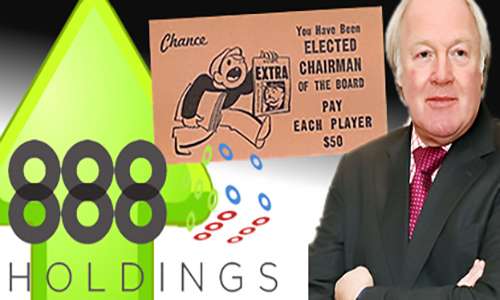888 Holdings Owner Rankled by Failed William Hill Bid
On Tuesday, William Hill, the largest bookmaker in the United Kingdom, announced that it had both received an acquisition offer from the pairing of 888 Holdings and The Rank Group (called the Consortium) and that its Board had rejected said offer. Following William Hill’s spurning of its competitors’ advances, 888’s owner and controlling shareholder, Eyal Shaked, seems like his feelings have been hurt.
The same day that William Hill issued a press release detailing the offer and reasons for its rejection, Shaked took to Twitter to express his pain, saying, “Pure ego made #WilliamHill reject #Rank and #888 £3.16bn bid and that will be their downfall.”
888 and Rank put out a statement themselves last month in confirming rumors that they were likely to make a bid for William Hill. In that statement, they used some excellent business words in saying why they wanted to buy the company and create an even bigger gambling firm:
The Consortium sees significant industrial logic in the combination, through consolidation of their complementary online and land-based operations, delivery of substantial revenue and cost synergies and from the anticipated benefits of economies of scale which will accrue to all shareholders.
But William Hill did not see things the same way, saying that the proposal “substantially undervalues William Hill.”
“In addition,” Tuesday’s press release read, “the Board of William Hill does not believe that a combination of William Hill with 888 and Rank will enhance William Hill’s strategic positioning or deliver superior value for shareholders compared against William Hill’s strategy, which is focused on increasing the Group’s diversification by growing its digital and international businesses.”
William Hill’s Chairman, Gareth Davis, gave his two cents:
This conditional proposal substantially undervalues William Hill, is highly opportunistic and does not reflect the inherent value of the business. It is a very complex three-way combination at a low premium involving substantial risk for William Hill shareholders: execution risk, integration risk and risks of materially increased leverage. The Group has a strong team to deliver against our strategy to grow our digital and international businesses so we strongly advise that shareholders take no action.
As for the mechanics of the proposal, 888 and Rank would merge into BidCo, a new company which would then offer to buy William Hill for 199 pence per share and .725 shares of BidCo per share of William Hill. The estimated value of the BidCo shares would put the total offer at 364 pence per William Hill share, or about £3.2 billion.
Shaked was definitely a bit salty on Tuesday when he found out that William Hill wouldn’t go to prom with him, continuing to tweet, “#WilliamHill Rejects #888 offer. That’s the last I want to hear about #888 shareholders not willing to go big.”
 William Hill’s Board was not alone in not being so sure if a merger like this would be a good thing. Analysts, too, questioned the move. When the initial reports came out that 888 and Rank were going after William Hill, Warwick Bartlett, Chief Executive of Global Betting and Gaming Consultants, told GamblingInsider.com, “But I have to ask: Is this Gala Coral mark two? That was a company that had interests in bingo, casino and betting shops, plus an online business. It was hardly a success. The bingo business was sold to Caledonia, and ironically the casino business was sold to Rank.
William Hill’s Board was not alone in not being so sure if a merger like this would be a good thing. Analysts, too, questioned the move. When the initial reports came out that 888 and Rank were going after William Hill, Warwick Bartlett, Chief Executive of Global Betting and Gaming Consultants, told GamblingInsider.com, “But I have to ask: Is this Gala Coral mark two? That was a company that had interests in bingo, casino and betting shops, plus an online business. It was hardly a success. The bingo business was sold to Caledonia, and ironically the casino business was sold to Rank.
“For this tripartite merger to work there must be a clear emphasis on strategy and leadership. I think such a merger raises more questions than answers.”
David Jennings at Davy Research told the Financial Times, “A bid of 408p would be a decent premium, but we don’t see a rationale for Rank and William Hill coming together. William Hill wants to internationalise and focus on its online business, and we don’t see how a tie-up with Rank would help them do that. The shareholder base will need some convincing.”
Note that he said 408 pence would be a “decent” premium. The Consortium’s offer of 364 pence per share wasn’t even close to that. The Board agreed that it wasn’t enough, mentioning in the press release that it was too low of a premium – 16 percent over William Hill’s stock price when the initial announcement was made of a possible offer and 11 percent over the share price the day before the offer was made.
Last year, the roles were reversed, as it was William Hill making a £700 million bid for 888 Holdings. Shaked hearkened back to that on Twitter, feeling perturbed that William Hill wanted to combine forces with 888 one year, but won’t do so the next.
“Last year it was ‘key shareholder opting for higher returns,’ now its [sic] an opportunistic offer. See you next year…”
It is possible that 888 and Rank could come back with a high enough bid to satisfy William Hill from a financial standpoint, but considering William Hill’s other concerns, it is up in the air as to how much it might cost for William Hill’s board to not worry about that anymore.



















COMMENTS